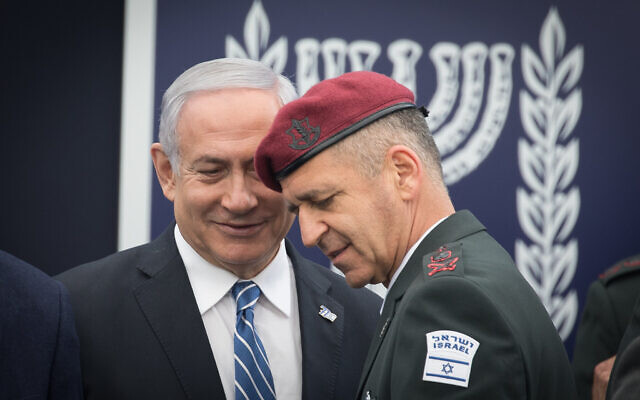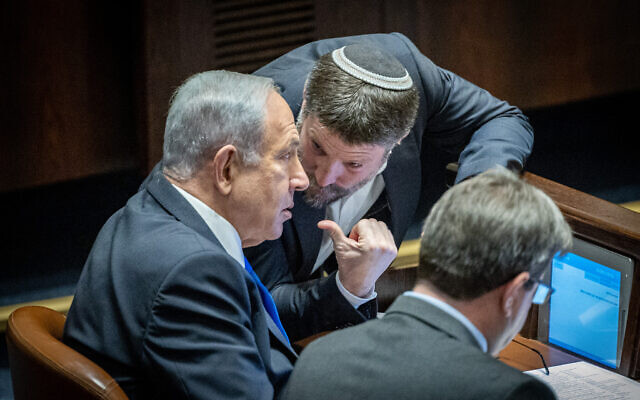Outgoing military head Aviv Kohavi and incoming PM agree to advance military-linked legislation only after IDF ‘presents the consequences and significance’ of such bills

Outgoing Israeli military chief Aviv Kohavi expressed concerns to incoming prime minister Benjamin Netanyahu over coalition demands that touch on military authority, the Israel Defense Forces said Monday.
The phone call last week represented an extremely rare instance of a military chief wading directly into political machinations, underlining the tenor of alarm in a number of Israeli institutions regarding planned reforms by Netanyahu and his coalition partners when they take power.
The Israel Defense Forces confirmed the talks took place following leaks published Monday by Hebrew-language media, which said that Kohavi initiated the conversation with Netanyahu on Thursday.
In response to a query by The Times of Israel, an army spokesperson said the call was made following “reports on the possible legislations related to the IDF.”
“During the conversation, it was agreed upon that decisions that are tied to the IDF will be made only after the IDF presents the consequences and significance of such decisions,” a military spokesperson added in a later statement.
The concerns reportedly raised by Kohavi in the call included a plan to provide Religious Zionism head Bezalel Smotrich with a new independent office as a minister within the Defense Ministry to oversee areas of the West Bank fully controlled by Israel, known as Area C.
Netanyahu’s Likud is set to form a government with far-right Otzma Yehudit, Religious Zionism, and Noam, as well as his long-time ultra-Orthodox partners, Shas and UTJ, which together won 64 seats in the 120-seat Knesset in November’s election.
Under the terms of draft coalition agreements, Smotrich’s role as a minister within the Defense Ministry will allow him to appoint the generals leading the hybrid civil-military Coordinator for Government Activities in the Territories and its office overseeing many settlement issues, the Civil Administration, subject to Netanyahu’s approval.
Currently, the major general in charge of COGAT is appointed by the defense minister at the recommendation of the IDF chief of staff, and the brigadier general overseeing the Civil Administration is appointed by the IDF chief of staff.

Kohavi also reportedly brought up plans for far-right Otzma Yehudit leader Itamar Ben Gvir to take control of the West Bank Border Police, as part of his promised expanded role as minister in charge of police. The unit is currently subordinate to the army and Defense Ministry.
The IDF chief, who will leave office on January 17, reportedly expressed “deep concern” about such activities harming the military.
Channel 12 news quoted Kohavi as saying: “The agreed-upon changes break the chain of command and undermine the sovereignty of the general of the Central Command General and the responsibility of the IDF in [the West Bank].”
Kohavi and Netanyahu apparently did not discuss a report that the incoming government seeks to give the Chief Rabbinate control over selecting the IDF chief rabbi, and force him to follow the rabbinate’s religious rulings. The issue had apparently not yet been widely reported when the Thursday call took place.
Kohavi’s unusual call to Netanyahu was approved by Defense Minister Benny Gantz, the network reported.

The seemingly coordinated leaks on the call were attributed by Hebrew language media to a source familiar with the matter, without specifying whether it was the army or someone close to Netanyahu.
The IDF denied it had initiated the publication of the call, seemingly blaming a political source for doing so, and said it was not behind the “false quotes” attributed to Kohavi.
“The IDF must be kept out of the political discourse,” the military added.
Netanyahu’s office issued a response to the reports saying it “does not respond to [queries] on conversations between the designated prime minister and senior defense officials.”
The Likud leader is set to present his government for approval by the Knesset on Thursday. However, full coalition deals have yet to be signed by the parties, with several outstanding issues remaining.
As reported by The Times of Israel
